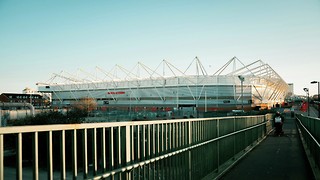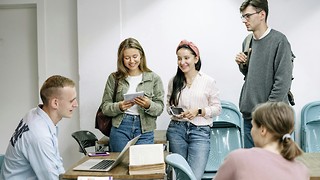Hundreds of students gather to quiz Toope on pensions, divestment, and Prevent
Tensions ran high in the most open discussion so far between the vice-chancellor and students since he took office
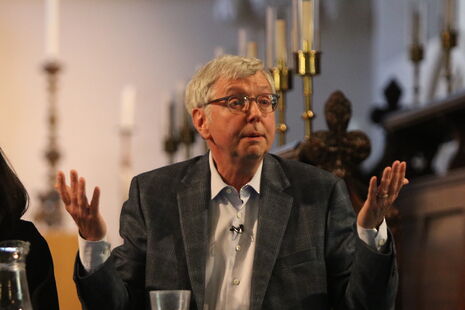
An estimated 550 staff and students gathered in Great St Mary’s Church this afternoon for an open meeting with vice-chancellor Stephen Toope, where he engaged in an open discussions with staff and students about the ethical and political issues at the heart of Cambridge.
The discussion spanned the University’s investments in fossil fuels, during which tensions peaked in the chamber, alongside its disciplinary procedure for sexual misconduct and the University’s actions during the ongoing national pensions dispute.
The meeting, which was demanded by student occupiers who staged a sit-in for the past five days in the University Old Schools’ building, was chaired by Martha Krish, CUSU’s education officer, who interviewed Toope alongside vice-president of the Cambridge UCU branch, Sam James.
Krish opened the discussion by asking Toope what position he holds in the negotiation process and how he hopes to use that position. In response, Toope acknowledged the influence of Cambridge but stressed that the issue was out of his control.
This was a response Toope turned to repeatedly during the discussion, such as when he later admitted that he could not guarantee that exams would not be affected by the strikes “because it doesn’t rest in my control”.
He also highlighted his lack of authority when discussing climate justice – one of the most heated subjects of the meeting. When Krish asked Toope what he would do to ensure that the University divests from fossil fuel investments, he responded “I can’t ensure it because it’s not my decision”, and declined to express his personal beliefs about divestment when pushed to.
He explained that the University’s governance system, including the divestment working group set up to evaluate and propose the University’s next course of action, must be allowed to run its course.
The issue of climate change provoked some of the most passionate questions from the audience and marked disagreements between Toope and questioners. The University was accused of having a conflict of interest as a result of funding from the fossil fuel industry, which Toope flatly denied.
It was later accused of funding human rights abuses in Nigeria by investing in Shell, to which Toope responded “How do we know that we’re investing in Shell?” An audience member then interjected “can you find out for us?” Toope explained that the situation was complicated because we hold “funds of funds”, to which a student yelled “invest only in transparent things!”
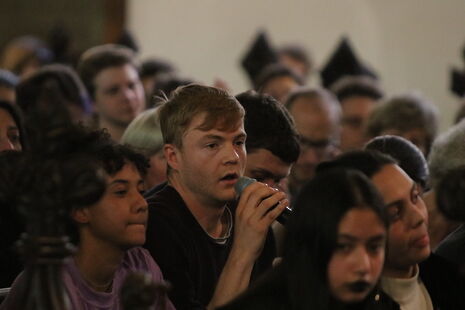
Another highlight of the meeting was the discussion of the “marketisation of education”, which has come to light as a broader issue surrounding the ongoing pensions dispute. The vice-chancellor and audience members discussed the highly-debated government’s Teaching Excellence Framework (TEF) and Research Excellence Framework (REF) classifications, as well as the National Students’ Survey. This afternoon’s discussion followed a letter from the vice-chancellor published in The Times this morning, in which he echoed the activists’ sentiments that current actions are “about the future of higher education, continued marketisation and the move towards students as consumers”.
When James brought up the letter, Toope reiterated the danger of treating students as consumers who attend university solely for economic gain: “In all of my interactions with students, I’m convinced that most people are here because they want to learn. They want to share. They want to be challenged. They want intellectual stimulation. They want to take all of that and make a contribution in whatever way.” His response was met with loud applause.
Krish then opened the discussion to questions from audience members, many of whom continued the theme of marketisation. One student’s question about how Toope would oppose TEF and REF was met with applause, and Toope responded by agreeing that these frameworks are “products of particular time” and argued that they “should be challenged”.
The meeting also covered the Prevent legislation, which Krish asked about after discussing climate justice. Toope expressed disapproval of Prevent, firmly agreeing that it constitutes a threat to freedom of speech and other civil liberties. He also expressed support for decolonisation efforts.
When the topic was opened to the audience, a student asked, to thunderous applause, about Cambridge’s partnership with arms manufacturer BAE Systems and its complicity in “war crimes and the arms trade in the global south”. Toope, who admitted he was not informed about such partnerships, promised to take a close look at them.
After the topic shifted to rent prices, Toope once again highlighted that he has little control over the colleges, but he said that what the university could do was expand student bursaries through a “much more expansive student support scheme.”
The final topic discussed was the disciplinary procedure regarding sexual misconduct. Krish asked whether Toope supports changing the standard of proof for sexual misconduct from the criminal standard of requiring proof beyond reasonable doubt to the civil standard that considers a balance of probabilities.
Toope said that he personally supports the civil standard because he believes that universities are not well placed to investigate to the criminal standard, but he once again stressed that he is only one voice among many in coming to a decision.
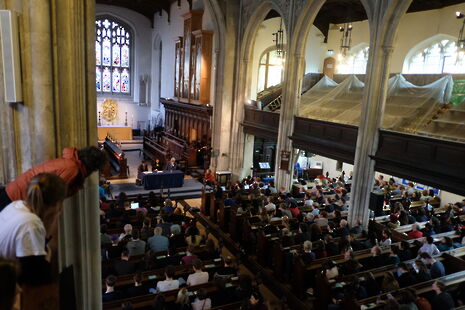
Today’s meeting was organised after the occupiers of the Old Schools issued the following demand on Tuesday: “In line with Toope’s promises to being open and transparent, to hold an open meeting with students and staff to discuss the handling of the pension scheme, and further issues of institutional accountability and democracy. This should include transparency around the university’s investments, especially relating to staff pensions.”
Toope agreed to the demand on Wednesday, emailing the occupiers that “I have already agreed to a 1-1/2 hour open meeting chaired by CUSU and with an official Cambridge UCU executive member also involved.”
The meeting came immediately after a rally, held on King’s Parade, during which student activists ended their five day occupation of the Old Schools and declared it ‘a success’. The occupiers were acting in solidarity with striking lecturers, who have been on strike since 22 February in protest of proposed changes to staff pensions. The changes could, according to analysis by actuarial consultants First Actuarial, leave staff as much as £200,000 worse off than under the previous scheme.
The losses would be the result of a shift from the old defined benefits pension scheme, which places risk on employers, and the proposed defined contribution pension scheme, which places risk on employees. This distinction was discussed during the meeting, during which Toope questioned the tendency to frame the debate as a binary, arguing that the risks should instead be balanced between employers and employees.
Cambridge Defend Education, members of which organised the occupation, said in a statement to Varsity: “Today’s staff and student meeting was a positive first step in the democratisation of Cambridge, demonstrating that targeted direct action can rapidly bring even the most powerful institutions to account.
“We welcome Toope joining us in opposition to Prevent and the marketisation of Higher Education, and look forward to him contributing to our campaigns on these issues to make Cambridge the ‘social leader’ we all want it to be. We’re also hopeful about his commitments to investigate financial links with the arms trade and the university’s role in the Cambridge housing crisis.
“However Toope’s commitment to accountability and democracy must extend further, in particular on the issue of divestment. He was again ambiguous about his position on the pensions dispute, and as this dispute continues we will keep demanding he listen to overwhelming support for the strikes and be clear in his opposition to pension cuts.”
A second open meeting, which the vice-chancellor has agreed to, is scheduled for 26th April, within the first week of Easter term.
 News / Cambridge academics sign open letter criticising research funding changes22 February 2026
News / Cambridge academics sign open letter criticising research funding changes22 February 2026 News / Student and union protesters hold ‘Trans Liberation Solidarity Rally’ 24 February 2026
News / Student and union protesters hold ‘Trans Liberation Solidarity Rally’ 24 February 2026 News / Union speakers condemn ‘hateful’ Katie Hopkins speech14 February 2026
News / Union speakers condemn ‘hateful’ Katie Hopkins speech14 February 2026 Features / Beyond the porters’ lodge: is life better outside college?24 February 2026
Features / Beyond the porters’ lodge: is life better outside college?24 February 2026 Theatre / Footlights Spring Revue? Don’t Mind if I Do!25 February 2026
Theatre / Footlights Spring Revue? Don’t Mind if I Do!25 February 2026






